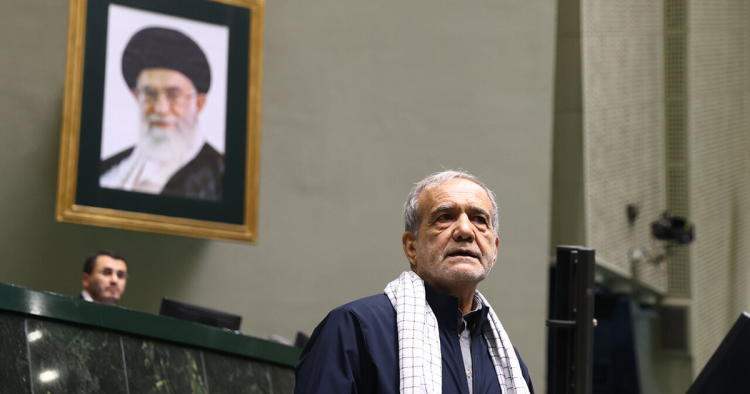Where is Ali Khamenei? That is the question on the minds of many Iranians and foreign observers in the aftermath of the 12-day war between Iran and Israel. As missiles rained down and retaliatory strikes escalated, one voice was conspicuously absent: that of the supreme leader of the Islamic Republic. By law, he alone holds the authority to declare war or peace. Yet, as the administration of President Donald Trump brokered a cease-fire between Iran and Israel, Khamenei has not addressed the public, explained Iran’s strategy, or claimed victory. Instead, there has just been silence — one that may speak louder than any televised speech.
In this leadership void and amid a crisis of direction, Masoud Pezeshkian, Iran’s president, has become the public voice of the regime, offering condolences, promoting unity, and perhaps most notably, extending an olive branch. In multiple calls with regional leaders, including Saudi Crown Prince Mohammed bin Salman and Oman’s Sultan Haitham bin Tarik, Pezeshkian declared Iran’s readiness to resolve its disputes with the United States based on “international frameworks.”
At home, he is seemingly using the opportunity to promote a new kind of governance going forward after the war with Israel. He praised the Iranian people for their resilience across ideological lines and called for a merit-based political system free from factionalism. Government spokesperson Fatemeh Mohajerani echoed the message, portraying this as a historic moment of unity and urging a redefinition of the social contract between state and society. From cabinet meetings to televised briefings, it is Pezeshkian and his team, not the supreme leader, who are publicly steering the ship.
Is this a cosmetic change or does it reflect a deeper shift in power? There is reason to believe that Khamenei and senior figures in the Islamic Revolutionary Guard Corps are in hiding or at least in strategic retreat while they remain potential targets for the Israelis. This level of fear is understandable. Israel’s precise targeted killings of high-ranking regime officials and America’s airstrikes on Iranian nuclear facilities have upended all previous war theories that officials in Tehran might have held. With the military establishment battered and the leadership exposed, the regime may have opted to let Pezeshkian play the role of public statesman while preserving its ideological core in the shadows.
That choice may also be tactical. Khamenei's silence allows for plausible deniability and strategic ambiguity. It shields the ideological leadership from accusations of retreat while giving moderates room to maneuver. Iran has used this playbook before: Recall the cease-fire with Iraq in 1988, when the Islamic Republic finally accepted UN Security Council Resolution 598 after years of costly defiance. Then too, the leadership allowed more pragmatic figures like Ali Akbar Rafsanjani to handle the messaging.
Could this be another such moment? Perhaps. Pezeshkian’s calls for dialogue with the US, his emphasis on regional diplomacy, and his push for inclusive governance all hint at a possible pivot. The cease-fire, however fragile and externally imposed, has created a political opening. Whether this opportunity will be used to recalibrate Iran’s posture or simply to buy time remains unclear.
The key question is whether Pezeshkian’s overtures reflect a real shift in power or are merely a facade. Is the moderate president genuinely being empowered to redefine Iran’s engagement with the world? Or is he a convenient front for a regime still firmly under Khamenei’s control? We do not know. But in moments of uncertainty, hope and caution walk hand in hand. For Iran and the world, the emergence of a less confrontational voice is worth watching and perhaps, cautiously, believing in.
Alex Vatanka is a Senior Fellow at MEI.
Photo by Iranian Presidency/Anadolu via Getty Images
The Middle East Institute (MEI) is an independent, non-partisan, non-for-profit, educational organization. It does not engage in advocacy and its scholars’ opinions are their own. MEI welcomes financial donations, but retains sole editorial control over its work and its publications reflect only the authors’ views. For a listing of MEI donors, please click here.













